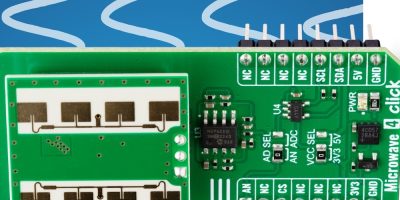Motion sensor board uses Doppler shift technology
MikroElektronika (Mikroe) has introduced a new motion sensor Click board to support the development of intrusion alarms, automatic door openers and presence-sensing applications.
Microwave 4 Click uses the Doppler Shift phenomenon to sense motion. It is based on the PD-V12, a miniature high-frequency microwave transceiver from Ningbo Pdlux Electronic Technology. This motion sensor is a K-band bi-static Doppler transceiver module. It is housed in a metal can and features a built-in resonator oscillator (CRO), providing a stable operation as it improves its front signal-receiving ability and reduces its blind area. Y
The Microwave 4 Click detects the frequency shift between a transmitted and a received signal reflected from a moving object within the field of view of the transceiver.
The radiated power (EIRP) emissions of less than 3mW at maximum meet the FCC and CE regulations. The noise voltages at the output port inside an anechoic chamber are measured from 10 to 100Hz. The received signal strength (RSS) is measured at the total one-way path loss of 70dB. The module uses two antennas, one for receive (RX), one for transmit (TX) with a maximum gain of 0dBi. The antennas are installed in such a way that allows the module to operate at closer than 200mm to users or nearby persons.
The new board is one of nearly 100 motion sensor Clicks, and one of over 500 sensor Clicks available from Mikroe. Click boards enable design engineers to change peripherals easily, cutting months off development time. The mikroBUS socket standard enables any Click board to be instantly connected to the microcontroller or microprocessor on a main board.
Many leading microcontroller companies including Microchip, NXP, Infineon, Dialog, STM, Analog Devices, Renesas and Toshiba now include the mikroBUS socket on their development boards.
MikroElektronika (Mikroe) invented the mikroBUS development socket standard and the compact Click boards for peripherals that use the standard to reduce development time. Now the company offers more than 1500 Click boards and the mikroBUS standard is included by many leading microcontroller companies on their development boards.
SiBRAIN is Mikroe’s standard for microcontroller development add-on boards and sockets and the company’s DISCON standard enables uses to choose between a wide variety of supported LCDs and touchscreen options. Mikroe also offers NECTO, claimed to be the world’s most flexible IDE (integrated development environment), as well as what it says is the industry’s widest range of compilers, plus development boards, programmers and debuggers. Planet Debug is believed to be the embedded industry’s first hardware-as-a-service. It enables designers to develop and debug embedded systems remotely over the internet without investing in hardware.




